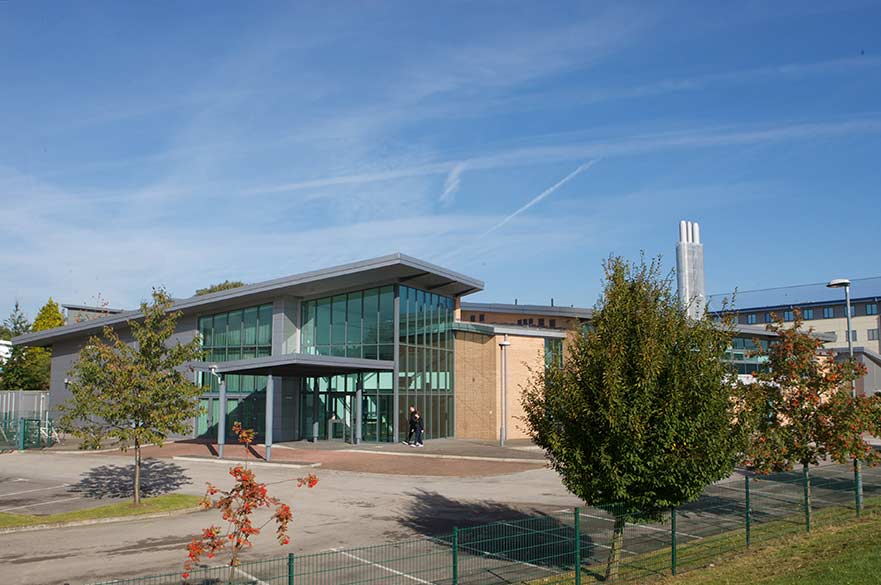Rosalind Franklin Building
The Rosalind Franklin Building is home to Chemistry at NTU and armed with the cutting-edge facilities such as our Super Lab.
About the Rosalind Franklin Building

Rosalind Franklin Building exterior
Opened in 2012 by the Sir Robert Winston and named after the British biophysicist and X-ray crystallographer - Rosalind Franklin, this facility stands as a testament to technological advancement in education and is the home to Chemistry at NTU.
As a chemistry, bioscience and forensic science student, you will have the opportunity to thrive in an environment that encourages innovation and fuels your curiosity. Nestled within its walls is our impressive Super Lab, a cutting-edge facility equipped with state-of-the-art technology, as well as other laboratories that that empower both students and staff to excel in their pursuit of world-class research.
The building houses carefully designed laboratories and advanced equipment that cater to the diverse needs of chemistry and bioscience teaching and research within the School of Science and Technology. It's a space where you can explore, learn, and make ground breaking discoveries.
Image gallery
Specialist laboratories
The labs mentioned below are used by students majoring in chemistry, forensic science, and bioscience. These dedicated spaces offer a hands-on learning environment where students can apply theoretical knowledge and conduct practical experiments to enhance their research and investigation skills.
In this lab, we prioritize your learning journey by providing you with advanced technology, personalized instruction, and a secure environment. With ample space for almost 200 students, we have carefully crafted innovative solutions to make your learning journey exceptional. When you step into the lab, you'll receive a personalized headset and receiver. This technology let's you to tune in directly to your tutor and engage in your lab session. You'll receive personalized guidance and support from technicians, allowing you make most out of your learning experience. All your lab results will be recorded or photographed using a tablet. These records are then uploaded for your convenience to enable you to access them outside of the lab.
As the lab maintains a containment level 2 facility to ensure everyone's safety, you won't be able to bring your notebooks and other personal belongings inside. This measure prevents any potential infections and maintains a secure environment for your lab studies.
The lab is equipped with a variety of chromatographic and spectroscopic equipment, including gas chromatography with mass spectrometry (GC-MS), high performance liquid chromatography (HPLC), inductively coupled plasma with mass spectrometry (ICP-MS) among others. Students have the opportunity to gain practical experience in using these analytical techniques throughout their studies, which can be further enhanced through their research projects. The lab supports teaching in Chemistry and Forensic Science, covering modules such as Drugs of Abuse, Advanced Chemical Analysis, and Analytical Toxicology. It also serves as a hub for research and commercial projects, involving the analysis of diverse sample types like food and drink, cosmetics, e-cigarette liquids, legal highs, and river water.
This lab houses a variety of tools, such as a microwave digestor, centrifuges, sample concentrators and more to assist students in preparing their samples for analysis. The lab is equipped with UV-visible spectrometers, Fourier transform infrared (FTIR), a flame photometer and Karl Fischer titrators for students to test the samples they generate. The lab supports teaching and research projects in Chemistry and Forensic Science, specifically focusing on areas like Analytical Toxicology, Drug Detection and Screening, and Advanced Chemical Analysis. Various types of samples, including food and drink, cosmetics, river water, and pharmaceuticals, are handled in this lab.
This lab is equipped with 25 double occupancy fume hoods, which are used in undergraduate teaching experiments for inorganic, organic, and physical chemistry. It features six rotary evaporators, which remove solvents from mixtures and reactions under controlled pressure and temperature conditions. This selective process targets and boils solvents. The lab also houses three Fourier Transform Infrared Spectrometers, which are used to characterize unknown compounds and aid in their identification. Additionally, there are various other pieces of equipment available, including hot plates, water-free condensers, UV-visible spectroscopy, an automatic melting point machine, pH and conductivity meters, aluminium heat blocks, and analytical and top pan balances.
Connected to Experimental Teaching Lab is the X-Ray imaging and NMR suite. Within this suite, there are two Nuclear Magnetic Resonance (NMR) spectrometers, utilized to ascertain the molecular identity and structure of substances at the atomic level. This enables the identification of physical and chemical properties. Additionally, the suite accommodates two X-Ray Diffractometers, which are employed to determine the crystallographic structure of materials.
Leading research
Within our walls we foster an environment of collaboration, bringing together brilliant minds to tackle the most pressing challenges of our time. Our team of experts at NTU continuously pushes the boundaries of medical field, employing state-of-the-art technology to develop internationally-recognized solutions. Our pioneering work in 3D security scanning and vision systems aim to revolutionize the way we perceive and interact with the world around us. We are also exploring nanomedicine research - unlocking the potential of nanotechnology, seeking innovative ways to diagnose, treat, and prevent diseases.